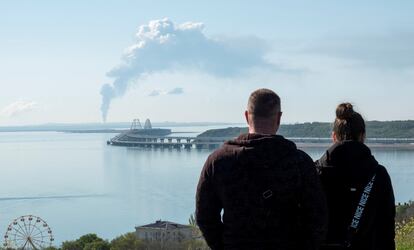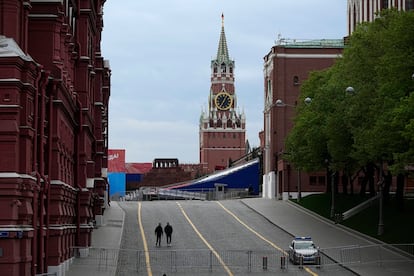Russia tightens Victory Day security after Putin ‘assassination’ attempt and wave of sabotage attacks
The alleged drone attack on the Kremlin, the destruction of several fuel depots and the derailment of two trains in recent days has placed Moscow on high alert ahead of May 9


The shooting down of two drones over the Kremlin which, according to the Russian authorities, was an attempt to assassinate President Vladimir Putin, took place amid a wave of sabotage operations and attacks both on Russian soil and in the territories that Moscow has occupied in Ukraine. Kyiv was swift to deny any involvement for the alleged assault on the seat of Russian government and views the incident as a likely false flag attack to justify an escalation of the war. “Ukraine has nothing to do with drone attacks on the Kremlin,” said Volodymyr Zelenskiy’s senior advisor, Mykhailo Podolyak, on Wednesday.
Regardless of who is responsible for the reported attack, which has not been independently verified, the incident came after explosions that derailed two trains in the Bryansk region, on the border with Ukraine. Overnight on Tuesday, another drone destroyed a fuel depot on Russian soil, in the town of Volna, near the Kerch Strait, where an attack last October seriously damaged the only bridge linking Russia and the Crimea Peninsula, illegally annexed by Moscow in 2014. These latest attacks have heightened tension in Russia, which is tightening security ahead of the upcoming Victory Day celebration on May 9, which marks the Soviet Union’s defeat of Nazi Germany in 1945.
The mood in Russia this year is very different than it was in 2022, when the Kremlin announced that its “special military operation” in Ukraine was going “according to plan.” Mariupol was about to fall and Kherson — which has since been liberated — had been occupied. Thousands of Russian citizens paraded along Moscow’s Tverskaya Street carrying portraits of ancestors who suffered through the brutality of World War II. This year, the civilian march will not be held for security reasons, although the Kremlin has said that Putin will deliver his traditional address to troops in Red Square.

In Moscow, security has been ramped up ahead of Victory Day. Access to Red Square was closed two weeks in advance and there is a heavy police presence in the surrounding areas, with regular searches being carried out. Several government buildings have installed anti-aircraft batteries on their roofs and the chairman of the defense committee of the Russian parliament, Andrey Kartapolev, has recommended that private companies acquire their own anti-drone systems. Traditional military parades will take place in Moscow and other cities, but not in the regions bordering Ukraine.
The drone attack on Volna, which lies 300 kilometers (185 miles) behind the front lines, has called into question Russia’s anti-aircraft capabilities. According to the state news agency Tass, the explosion caused a fire that covered 1,200 square meters. It was the second strike on a logistical target on Russian soil or in the occupied territories in the space of four days, after another drone destroyed a fuel depot in Sevastopol, Crimea, last Saturday. Ukrainian intelligence estimates that 10 storage tanks with a total capacity of 40,000 tons of fuel were destroyed. Sevastopol, where Russia’s Black Sea Fleet is stationed, was also targeted by unmanned devices on April 24, although according to the Russian Defense Ministry there were no losses.
Tension is at its highest in Crimea and the Russian regions bordering Ukraine. The governor of the Krasnodar region, Veniamin Kondratiev, has denied rumors of an alleged civilian evacuation of Volna. “It is untrue; the situation does not require an evacuation. I ask people to remain calm,” he said. Last weekend, a mile-long queue of cars formed on the Kerch Strait Bridge. According to local media, it was due to increased security checks by police forces, but the Ukrainian press attributed the traffic jams to fear generated by the new wave of attacks.
The Russian Federal Security Service (FSB) said on Wednesday it has prevented an attack against the Kremlin-appointed governor of Crimea, Sergey Aksyonov, the president of the regional Parliament, Vladimir Konstantinov, and the mayor of Yalta, Yanina Pavlenko. Aksyonov, whose party garnered barely 4% of the vote in the last regional elections before the annexation, held in 2010, has claimed that this alleged group was also responsible for the sabotage of a railway in the Bakhchysarai district outside Sevastopol.
Similar attacks have taken place in the Russian province of Bryansk. Two freight trains were disabled on consecutive days by bombs placed on the tracks. On Tuesday, a 20-car freight train was derailed after an explosion near Snetzhetskaya, confirmed the region’s governor, Alexander Bogomaz, who added there had been no casualties. A day earlier, another train carrying fuel and construction materials from Belarus derailed in the central part of the province due to another explosion. In the same region, a shell killed four civilians in the border village of Suzemka last Sunday, according to the regional administration.
Sign up for our weekly newsletter to get more English-language news coverage from EL PAÍS USA Edition
Tu suscripción se está usando en otro dispositivo
¿Quieres añadir otro usuario a tu suscripción?
Si continúas leyendo en este dispositivo, no se podrá leer en el otro.
FlechaTu suscripción se está usando en otro dispositivo y solo puedes acceder a EL PAÍS desde un dispositivo a la vez.
Si quieres compartir tu cuenta, cambia tu suscripción a la modalidad Premium, así podrás añadir otro usuario. Cada uno accederá con su propia cuenta de email, lo que os permitirá personalizar vuestra experiencia en EL PAÍS.
¿Tienes una suscripción de empresa? Accede aquí para contratar más cuentas.
En el caso de no saber quién está usando tu cuenta, te recomendamos cambiar tu contraseña aquí.
Si decides continuar compartiendo tu cuenta, este mensaje se mostrará en tu dispositivo y en el de la otra persona que está usando tu cuenta de forma indefinida, afectando a tu experiencia de lectura. Puedes consultar aquí los términos y condiciones de la suscripción digital.








































